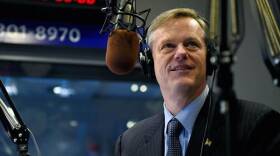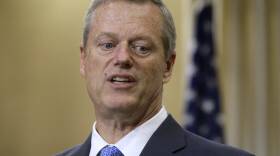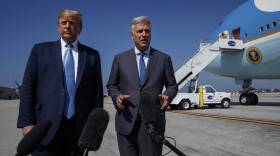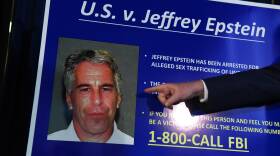EXPLORE MORE
Coming up Wednesday on BPR, live from the BPL:
The Culture Show’s Jared Bowen
Congresswoman Ayanna Pressley
Tufts' Fletcher School international affairs expert Daniel Drezner
Food policy analyst Corby Kummer
Dr. Atul Gawande, former assistant administrator for global health at USAID
Recent segments
-
Ask The Governor: 09/19/19
On Sept. 19, 2019 Gov. Charlie Baker joined Boston Public Radio for another edition of "Ask the Governor." -
Judge Denies Request To Dismiss AG Healey's Lawsuit Against Purdue Pharma
A judge has denied Purdue Pharma's motion to dismiss Attorney General Maura Healey's lawsuit against the company. -
Baker Says His Office Was Unaware Of Problems At RMV
“If I had known about it I would have fixed it, and once I did know about it I did,” Baker said. -
Bowen: Fans Of The Show Will Love 'Downton Abbey' The Film
After four years off the air, fans of “Downton Abbey” will be able to revisit the Crawley when the film of the same name opens in theaters on Thursday. -
Juliette Kayyem: Robert O’Brien Was Chosen 'Because He’s Mike Pompeo’s Guy'
“There’s no reason to believe that’s where his skill is,” Juliette Kayeem said of President Donald Trump’s choice for national security adviser. -
Leung: MIT Had To Know What Jeffrey Epstein Did When They Took His Money
MIT president L. Rafael Reif said the university was unaware of Jeffrey Epstein's sexual misconduct when they took his money.
Listen to previous shows
-

BPR Full Show: For the Love of Coffee
Today on Boston Public Radio: Art Caplan weighs in on the role of vaccine mandates, and the quick spread of vaccine misinformation on social media. Caplan is the Drs. William F. and Virginia Connolly Mitty Professor and founding head of the Division of Medical Ethics at NYU School of Medicine in New York City. Then, we asked listeners about their experiences with the MBTA following a slew of recent derailments and other accidents. Juliette Kayyem updates listeners on all things national security, including updates on trials of those involved in the Jan. 6 riots, which have been slowed down due to an abundance of evidence. Kayyem is an analyst for CNN, former assistant secretary at the Department of Homeland Security and faculty chair of the homeland security program at Harvard University’s Kennedy School of Government. Jamarhl Crawford and Tanisha Sullivan criticize a lagging timeline and lack of transparency regarding efforts for police reform, and discuss the need to put reform at the top of the agenda in the mayoral race. Crawford is an activist, community organizer and Editor of The Blackstonian. Sullivan is an attorney and the President of NAACP Boston Branch. They are both members of the Boston Police Reform Task Force. Brian McGrory talks about the impact of The Boston Globe’s Spotlight team, how the Globe is covering the mayoral race and Tom Brady’s upcoming return to Gillette Stadium Sunday. McGrory is the editor-in-chief of the Boston Globe. Jared Bowen previews latest art exhibits, including the Titian exhibit at the Isabella Stewart Gardner Museum, the Frida Kahlo exhibit at Brandeis’ Rose Art Museum and Mariano Rodríguez’s exhibit at Boston College’s McMullen Museum of Modern Art. Bowen is GBH’s Executive Arts Editor and host of the TV series Open Studio. Then, we ask listeners what they love (or hate) about coffee in honor of today’s National Coffee Day. -

BPR Full Show: Tom Brady's Homecoming
Today on Boston Public Radio: We start the show by asking listeners their thoughts on vaccine mandates and people threatening to quit their jobs before getting the shot. Trenni Kusnierek updates listeners on all things sports, including rifts in the NBA over vaccines and Tom Brady’s return to Gillette Stadium. Kusnierek is an anchor and reporter for NBC Sports Boston, as well as a Boston Public Radio contributor. Dr. Renee Crichlow calls out remaining healthcare workers who are not yet vaccinated, and talks about latest data on vaccine efficacy months after vaccination. Crichlow is the Chief Medical Officer at Codman Square Health Center and the Vice Chair of Health Equity at the Boston University Department of Family Medicine. Bill McKibben discusses what it would mean for the plant if President Joe Biden fails to pass his economic agenda, and previews his new project, Third Act, which seeks to engage older individuals with climate activism. McKibben is co-founder of 350.org and the author of numerous books about climate change. His latest book is “Falter: Has the Human Game Begun to Play Itself Out?” Nia Grace opens up about her newest restaurant at Northeastern, The Underground Café, and talks about the challenges of keeping restaurants afloat during the pandemic. Grace is the owner and operator of Darryl’s Corner Bar and Kitchen in the South End, and one of the founders of the Boston Black Hospitality Coalition. She is also the owner of The Underground Café and Lounge, which opened last week on the campus of Northeastern University. John King goes through top political headlines, including Republican threats to Biden’s economic agenda and persisting allegiances to Donald Trump. King is CNN's Chief National Correspondent and anchor of "Inside Politics,” which airs weekdays and Sunday mornings at 8 a.m. We end the show by asking listeners about their thoughts on Tom Brady’s upcoming return to Boston Sunday night. -

BPR Full Show: Holiday Shopping Came Early This Year
Today on Boston Public Radio: EJ Dionne weighs in on whether he thinks the Democrats will pass President Joe Biden’s economic agenda, and what it would mean for the party if they fail. He also talks about his visits to mayoral race victory parties and his thoughts on the race. Dionne is a columnist for The Washington Post and a senior fellow at The Brookings Institution. His latest book is "Code Red: How Progressives And Moderates Can Unite To Save Our Country." Then, we talk with listeners about their thoughts on Biden’s economic agenda. Charlie Sennott discusses President Joe Biden’s decision to deport Haitian migrants, Angela Merkel stepping down as Chancellor and the results of Germany’s latest election. Sennott is a GBH News analyst and the founder and CEO of The GroundTruth Project. Chris Burrell unpacks his latest reporting for the Color of Public Money series, which showed that out of a $4.8 billion budget, Massachusetts spent less than $25 million in contracts with Black and Hispanic-owned businesses. Burrell is an investigative reporter covering criminal justice, housing, immigration and other topics for The GBH News Center for Investigative Reporting. Revs. Irene Monroe and Emmett G. Price III talk about a recent slew of racist incidents, including at UMass Amherst and the Roxbury Prep-Georgetown football game. Monroe is a syndicated religion columnist, the Boston voice for Detour’s African American Heritage Trail and a visiting researcher in the Religion and Conflict Transformation Program at the Boston University School of Theology. Price is the founding pastor of Community of Love Christian Fellowship in Allston. Together, they host GBH’s All Rev’d Up podcast. Richard Blanco read poems in honor of Hispanic Heritage Month, including his poem “Looking for the Gulf Motel,” and Caridad Moro-Gronlier’s poem “Analfabeta.” Blanco is the fifth inaugural poet in U.S. history. His latest book, "How To Love A Country," deals with various socio-political issues that shadow America. We end the show by asking listeners how they are planning around warnings of supply chain shortages impacting the holiday season. -

BPR Full Show: A Tribute to Chelsea
Today on Boston Public Radio: Ali Noorani talks about the resignation of Ambassador Daniel Foote, Special Envoy for Haiti, as the Biden Administration comes under fire for its treatment of Haitian refugees at the border. Noorani is the President & Chief Executive Officer of the National Immigration Forum. His forthcoming book is Crossing Borders: The Reconciliation of a Nation of Immigrants. Then, we ask listeners for their thoughts on the Biden Administration’s handling of the humanitarian crisis and treatment of Haitian migrants at the border. Callie Crossley continues the conversation about the treatment of Haitian migrants, and weighs in on the mayor’s race and perceptions of Annissa Essaibi George as OFD, or “Originally From Dorchester,” and Michelle Wu as NFH, or “Not From Here,” born in Chicago. Crossley hosts GBH’s Under the Radar and Basic Black. Andy Ihnatko weighs in on accusations of labor issues at Apple, newest potential security leaks and Gen-Z struggles with older technology. Ihnatko is a tech writer and blogger, posting at Ihnatko.com. Sue O' Connell discusses the status of LGBTQ+ rights with the ten year anniversary of the end of the Don’t Ask Don’t Tell policy, which kept LGBTQ+ service members in the closet. O’Connell is the co-publisher of Bay Windows and the South End News, as well as NECN's political commentator and explainer-in-chief. John King updates listeners on the results of the Arizona audit of the 2020 presidential election, which confirmed President Joe Biden’s win. He also talks about current political gridlock around the Infrastructure Bill. King is CNN's Chief National Correspondent and anchor of "Inside Politics,” which airs weekdays and Sunday mornings at 8 a.m. We end the show with guest and staff tributes to outgoing BPR producer Chelsea Merz, who is leaving GBH after over ten years. -

BPR Full Show: Michelle Wu Doesn't Want the Status Quo
Today on Boston Public Radio: We start the show by talking with listeners about the current gridlock in Congress, and why divisions persist despite Democrats’ control of the Senate, House and Presidency. Shirley Leung discusses her latest column about the escalating humanitarian crisis at Mass and Cass, and its impact on local businesses and nonprofits in the area. Leung is a business columnist for The Boston Globe and a BPR contributor. Dr. Eric Dickson gives a window into the pandemic in Central Massachusetts, where the largest healthcare system in Central New England has run out of ICU beds amid an influx of COVID-19 cases. Dickson is the President and CEO of UMass Memorial Health, based in Worcester. Paul Reville updates listeners on all things schools, including dropping MCAS scores and why he thinks Massachusetts schools are not as effective as they should be. Reville is the former Massachusetts secretary of education and a professor at Harvard University’s Graduate School of Education, where he also heads the Education Redesign Lab. His latest book, co-authored with Lynne Sacks, is “Collaborative Action for Equity and Opportunity: A Practical Guide for School and Community Leaders.” Boston City Councilor Michelle Wu talks about her views on racial justice, the transportation crisis and other visions for Boston as she moves forward in the race for city mayor. Wu is a Boston City Councilor At-Large running for mayor of Boston. Jon Gruber argues that the demand for workers amid high unemployment is due to workers’ desire for more humane hours, higher wages and generally better working conditions. Gruber teaches economics at MIT. He was instrumental in creating both the Massachusetts health-care reform and the Affordable Care Act, and his latest book is “Jump-Starting America: How Breakthrough Science Can Revive Economic Growth And The American Dream.” We end the show by asking listeners about ways they have built community during the pandemic.









